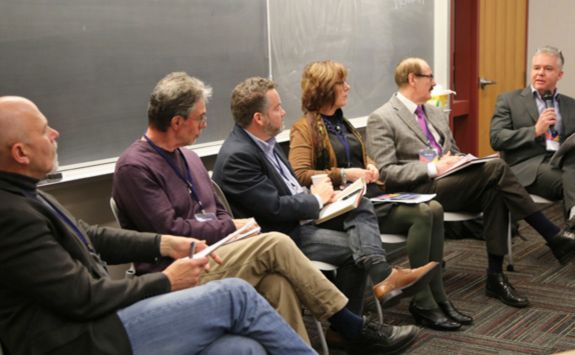Past REWP Events
Explore past events hosted by the Centre for Research on Entrepreneurship, Wealth and Philanthropy (REWP). Events highlighted key discussions on philanthropy, fundraising, and societal impact. They featured prominent academics, philanthropists, and thought leaders.
GeNErosity Festival 2018
7 to 27 November 2018
The GeNErosity Festival celebrated 900 years of philanthropy in the North East of England. The festival featured lectures, debates, and performances. They explored the history, impact, and future of giving in the region. It brought together community leaders, philanthropists, and the public to reflect on the transformative power of philanthropy.
REWP Symposium
7 June 2017 - Armstrong Building, Newcastle University, UK
REWP’s symposium gathered researchers and attendees to discuss key philanthropic research findings.
Building on this foundation, the symposium explored a range of research perspectives that examine philanthropy’s evolving role in society and its impact across various sectors.
Private Philanthropic Foundations and Entrepreneurship: A Research Agenda
Professor Roy Suddaby
Considerable research has been devoted to understanding the process by which new organizational forms emerge. But not all organizational innovation involves the de novo creation of a new organization. We examine the case of private philanthropic foundations – an ancient organizational form that has been adapted to contemporary demands. Foundations, as an organizational form, pre-date the nation-state, the corporation and the professional partnership. They are also an extremely resilient organizational form – some Islamic waqfs, for example, claim a continuous history of over five hundred years
Recently, private philanthropic foundations have emerged as powerful agents of social change. They represent significant accumulations of financial capital – the largest global foundations hold endowments that exceed the GNP of many nation states. They are also an increasingly popular organizational form – since 2013 the number of private foundations has increased by 35% and their total assets have doubled (Foundation Centre, 2016). Most critically, foundations have become global entrepreneurs with ambitious agendas for social change using tactics that often circumvent traditional organizational forms such as charities, traditional NGOs and government. One of the consequences of the new global scale and scope of private foundations, which have historically been privileged by low regulatory oversight, is that they appear to have even more autonomy and power at the global level. Foundations are one of the most independent institutions in modern society.
Despite this we have little understanding of their history, governance structure and their normative role in civil society. The purpose of this paper is to offer a theoretical overview and research agenda for this ancient but dramatically repurposed organizational form.
Inequality and Privilege in UK Higher Education Fundraising
Ms Alison Gibson
Almost 25 years have elapsed since the 1992 Higher Education Acts massively expanded the field of universities in the UK, with the intention of broadening access to higher education for UK students. Over the same period, we have also seen the transformation of universities in accordance with neoliberal principles. We use a Bourdieusian approach to analyse the evolution of the accumulated wealth, privilege and fundraising ability of Higher Education Institutions in the UK, exposing for the first time the true magnitude of inequality that has developed and persisted among Oxbridge, other pre-1992 universities, and universities minted by the 1992 Acts. We argue that these inequalities are the result of embedded and systemic privilege, and define a research agenda that will illuminate the practices, logics, and structures that have been causative.
Events, Hospitality and Elite Philanthropic Networking in China and the United Kingdom: A Comparative Study
Ms Ruomei Yang
There are two main problems with philanthropy as a solution to social problems arising from widening inequality. First, philanthropy represents wealth donated on a discretionary basis. Secondly, there exists a lack of real opportunities to deliver positive social change. This research devotes attention to a small, yet significant elite group: philanthropic elites in China and the UK. By examining high profile philanthropic events through the lens of in-depth case studies, the research explores the role of these events, in facilitating networking and social capital formation amongst elite actors.
From Cadbury to Kay: Intertextuality and the Evolving Discourse Of Corporate Governance Regulation in the UK
Dr Michael Price
The UK has a system of self-regulation in respect of approaches to corporate governance which represents a model that many other countries have sought to emulate. This paper reports on a corpus of texts which have influenced the UK Corporate Governance Code between 1992 and 2012. We observe perturbations tend to lead to the production of reports which present solutions to these problems. We argue that despite these perturbations, the publications of these reports has caused little substantive revision to the Combined Code and that this is illustrative of a more board process whereby elite groups self-regulate to fend off challenge that would otherwise follow, thereby protecting the legitimacy of the system itself.
This paper’s contribution is an analysis of the changing discourse of corporate governance reports over time using a discourse historical approach (Wodak 2011) to the analysis. Through a progressive discursive transition, from a popular to a technocratic discourse, arguments are deflated and heat is dissipated from key perturbations through the publication of reports. It is argued that these reports are therefore a method of appeasing public opinion by strengthening rules within existing frameworks, thereby preserving the power and wealth of the corporate elite to whom the texts are directly applicable.
We suggest that micro discursively, there is a shift in focus from structures and procedures in early texts to an increasing focus on individual behaviours, particularly in the period after 2007. The result is to assign fault for key perturbations individually, rather than systemically. This is therefore partly an interrogation of how ‘best practice’ is conceived of and conveyed over time, but it is also an example of how a defined corpus of texts gives stability and permanence to the ideas of the authors (Allen 2011).
Philanthropy, Enterprise and Society in the North East of England
Professor Charles Harvey
To what degree and in what ways has philanthropy served as vehicle for social change? How might philanthropy help promote social renewal in areas blighted by de-industrialization? As a geographically well delineated region with a long and diverse history that has suffered since the 1960s from industrial decline, the North East of England provides a rich setting for the exploration of these questions, historically and contemporaneously. Our historical study exposes the religious and historical roots of philanthropy and the continuing importance of past initiatives, when innovative ideas were enacted through a combination of enterprise and philanthropy, to present day organizations and institutions. Research, education, healthcare and numerous cultural organizations all rest on philanthropic foundations, the earliest extant North East charitable trusts dating back to the thirteenth century.
The role of philanthropy in society has changed markedly since the advent of the welfare state and the centralization of power. But philanthropy never disappeared and arguably is of growing importance as the boundaries of the state are eroded, particularly with respect to support for the front line charities providing services for the disadvantaged. Our evidence, however, is mixed. We define philanthropy as the voluntary gifting of resources from private wealth to promote charitable causes, projects or organizations and a philanthropist as a person who voluntarily gifts resources from private wealth to promote charitable causes, projects or organizations. By measuring philanthropic income and accumulations of philanthropic capital more exactly than is usual, avoiding double counting for example, we find that total income and endowments have grown, they remain small relative to need. Research intensive universities and some cultural organizations continue to be major beneficiaries of philanthropy, past and present, but by and large third sector organizations are under nourished and lack the capacity to fulfil their missions. In the North East there are notable examples of past and present generosity and initiative taking by philanthropic entrepreneurs, but, as might be expected, a large part of total philanthropic income stems from London based national charities and funding from philanthropic enterprises like the National Lottery and Children in Need, which paradoxically glean the majority of their revenues from ordinary folk. We suggest that much more needs to be done to put the excess resources of the rich to work in the urgent task of social renewal in the North East.

